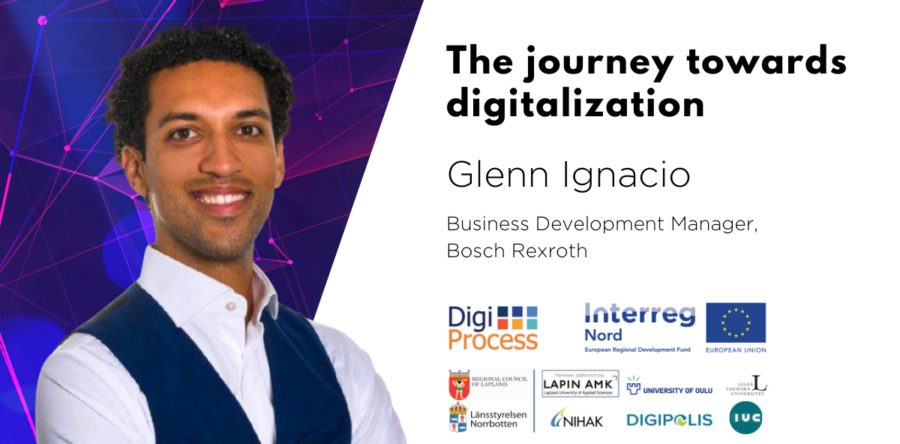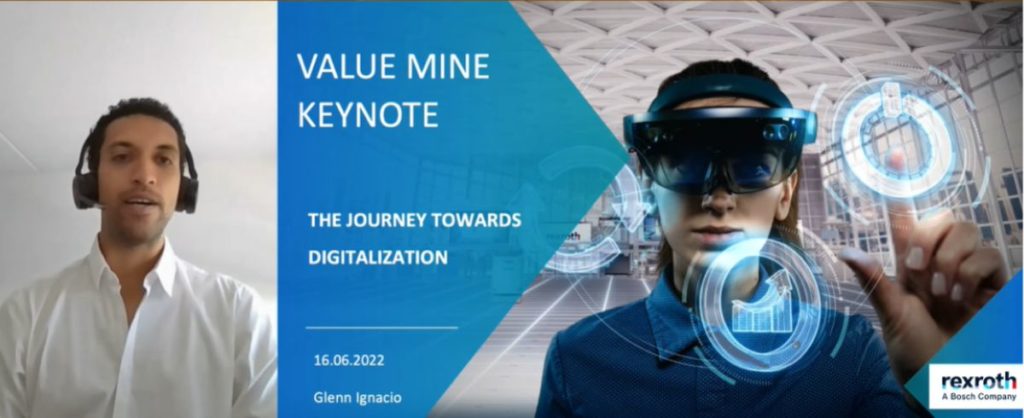
Forewords
The Value Mine crossborder event was organized 16th June 2022 as a hybrid side event of Euromine Expo in Skellefteå, Sweden. The event attracted participants from industry, SMEs, and other actors to hear and discuss the mining industry´s digital future. This post focuses on mining industry talk presented by Glenn Ignacio from Bosch Rexroth. Previous post was the inspirational speech of Sitra and next posts will focus on the industry talks of Boliden, Epiroc and Hannukainen Mining and after those we will publish SME talks.
Bosch Rexroth, Glenn Ignacio, Business Development Manager
In his presentation, Glenn told about Bosch Rexroth’s journey towards digitalization and the six steps of digitalization. He also gave examples of digitalization paying off.
Bosch Rexroth manufactures products and systems associated with the control and motion of industrial and mobile equipment. Nowadays 60% of their sales come from mobility solutions and 40% from industrial technology, energy & building technology and consumer goods. The company has almost 400 000 employees and is present in more than 60 countries. Bosch’s global manufacturing and sales network covers nearly every country in the world. Bosch invests billions in research and development and they have 129 engineering locations.
By 2025, the aim is for all Bosch products to either contain AI or have been developed or manufactured with its help.

Digital transformation happens in steps
-To get started with digitalization, you don’t need new machines. You can start with the current machines you have today, said Glenn and showed us a photo of a 134 years old machine which they had put sensors to collect data from it. -This is how simple you can start, continues Glenn.
Digital transformation cannot be done at once. Glenn presented the six steps towards digitalisation:
- Lean manufacturing: Optimize your value stream to minimize waste
-
This is the base where you start. Digitalization is not present on this stage yet.
-
- Connectivity & Digitalization: Good data from machines/processes
-
Simple step we can take is conditioning monitoring which can be simply gathering data and showing the real condition of your machines. This can help you get some extra information.
-
- Information: Available and affordable
-
Creating information out of the data for people. Data Insights & dashboards.
-
- Knowledge: Use Big Data to get Smart Data
-
Cloud analytics makes big data technologies accessible and affordable to almost any size of enterprise.
-
- Prognosis: Observe sequences/patterns
-
Does any machine need maintenance and when?
-
- Autonomy: Aware of state, own/others
-
-
This would mean machines can make decisions themself, and technology is not yet here.
-
People vs. machines
Who do we trust more – is it people or machines? Glenn talked about an interesting research Bosch made where people were asked about this. The research showed the answer depends on the topic.
In industrial production 11% say people, 57 % say artificial intelligence. Digital solutions were best accepted in industrial production, and the least in health problems (10%) and in personnel decisions (6%).
85% of those people who said yes, machines can make better decisions, said also that people should always have the ability to correct the decisions made by artificial intelligence.
Bosch sees people as key players. Bosch wants to use technology to do the simple repetitive tasks that are tiring and maybe even boring for people and use the machines and AI and use brain and creativity in a different way still for production.
Return on investment - is digitalization worth it?
Then the question every company is interested in: If we make the digital transformation – is it worth it? To answer this, Glenn showed examples of how Bosch has been able to save a lot of money and be more efficient with optimizing the ventilation process in one of their plants and creating a dynamic route planner for logistics goods traffic.
In the ventilation case, the toxic fumes have to be transported outdoors with ventilators. Because clean air is so important, the ventilators run constantly. When they started to measure the electricity the ventilators were using, they found out they were very costly. They connected the ventilation to the process and now the ventilators are only in use when needed, and not all the time as before. This simple connection was an investment of 700 000 € but in return it saves 630 000 € per year and in addition 3,7 MWh and 1,5 tons of CO₂ every year.
Another example is their dynamic route planner for logistics goods traffic. In one of their factories they have milk runs that deliver parts to different stations in the production. They used to drive rounds and rounds constantly whether or not the parts were needed. Then they created a link between how much is manufactured and how many parts is needed. Now the milk run is running in dynamic routes, so the transportation of parts is done only to the machines that need them. In this case efficiency increased 15%, utilization increased 30% and costs were reduced by 290 000 per year.
The conclusion is: If you do it right and you know your processes, digitalization can pay off easily.
Data enables new business models
In the end of his presentation Glenn reminded that data can enable new business models.
- Think about for example a business model where the uptime hours of your machinery is interesting. For example for every uptime hour of the machine you pay X amount of euros to the supplier who you got that machine from. That is an incentive for the supplier to create high quality equipment for you and you only pay for the time you use the machine. This can create different ways for financing and earning money for businesses.
 Glenn’s key take-aways:
Glenn’s key take-aways:
“Your machine is never too old to be digitazed.”
“People will remain the key player.”
“Digitalization helps you to increase your efficiency.”
Main contact and inquiries:
Liisa Koivisto, DigiProcess project, Kemin Digipolis Oy, +358 40 1980 567, liisa.koivisto@digipolis.fi









